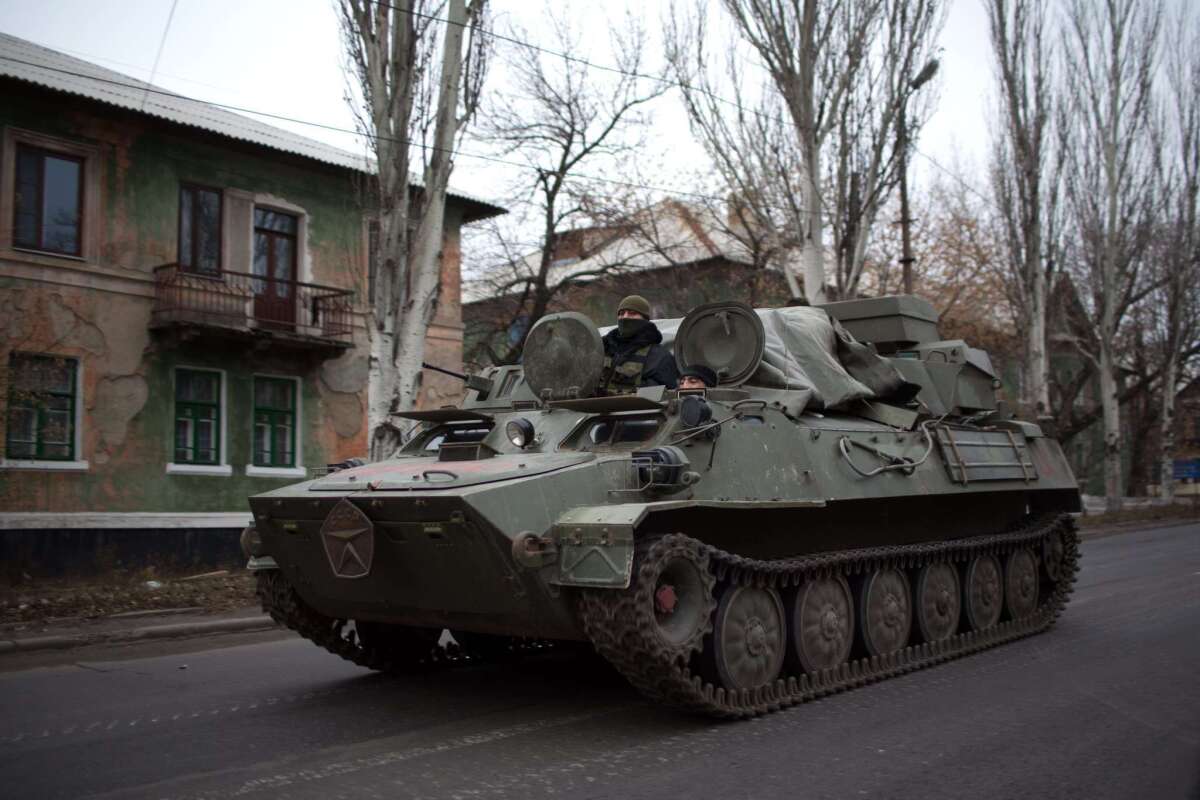Op-Ed: Why the U.S. has an obligation to help Ukraine defend itself

- Share via
With Russian tanks and other military equipment rolling into Ukraine, Kiev is learning the hard way that when you reside in a nasty neighborhood it doesn’t pay to get rid of nuclear weapons without ironclad security guarantees. But that is exactly what it did in December 1994 when it agreed to the Budapest Memorandum on Security Assurances co-signed by the United States, Russia and the United Kingdom.
As Russia took Crimea this year and continued to support the separatists, some Ukrainian officials called for a return to nuclear arms to stop Moscow from slicing and dicing up their nation. When he was defense minister in September, Valeriy Heletey gave expression to the possibility: “If we cannot protect Ukraine today, if the world doesn’t help us, we will have to go back to the development of nuclear weapons which will protect us from Russia.” Other officials conveyed similar views earlier in the year.
But the threat to go nuclear is a pipe dream. Although Ukraine operates 15 power reactors, it does not have the enrichment or reprocessing plants to produce fuel — which it imports from Russia — or bomb-making material. What Ukraine does have is the moral claim on Washington to step up and provide it with the conventional means to better protect itself.
That’s the gist of the Budapest Memorandum that the U.S. heavily promoted: Someone would come to Kiev’s defense were its territory violated. The agreement requires the parties to “respect the independence and sovereignty and the existing borders” of Ukraine; “refrain from the threat or use of force against the territorial integrity or political independence of Ukraine”; “refrain from economic coercion”; “seek immediate United Nations Security Council action to provide assistance to Ukraine … if Ukraine should become a victim of an act of aggression or an object of a threat of aggression”; and consult in the event a situation bears on commitments.
In his address to Congress during his September visit, Ukrainian President Petro Poroshenko starkly commented on the bind the Budapest accord placed his country: “Ukraine, which gave up the world’s third-largest nuclear potential in exchange for security assurances, was stabbed in the back by one of the countries who gave her those assurances.”
Secretary of State John F. Kerry cautiously acknowledged the same in March when he said Moscow had put “very clear legal obligations at risk.” However, Washington found itself flummoxed in crafting a response.
History had placed the U.S. between two ghosts of Europe’s 20th century past. A threat to go all in to protect Ukraine would hark back to the disastrous mobilizations that preceded World War I. There certainly was no gusto for that. But standing down, watching Russia gobble up more of Ukraine, would replay Europe’s disastrous failure to respond to Nazi Germany’s annexation of Austria and invasion of Czechoslovakia, which paved the road to World War II.
To thread the needle — avoid provoking Moscow by placing forces in Ukraine while still showing resolve — Washington and its allies chose a multiprong strategy: Give Ukraine nonlethal aid. Apply and ramp up economic sanctions. Modestly bolster the North Atlantic Treaty Organization’s eastern defenses as a warning to the Kremlin not to cross the alliance’s line.
Russia’s response has been more stealth fighters and convoys crossing into Ukraine, which leaves the U.S. strategy where?
History provides two other options: Sit back, pout and watch, the strategy Washington applied to Soviet interventions in Hungary and Czechoslovakia. The approach concedes Ukraine as part of Moscow’s sphere in influence or more. Or the U.S. can bleed the separatists and Russian intervenors by providing Ukraine with lethal weapons, and not just nonlethal aid, repeating the successful strategy the U.S. applied to Afghanistan during the Soviet occupation.
Is the second option plausible? Ukrainians have demonstrated the will to fight for their country. In his remarks to Congress, Poroshenko tried to embarrass Washington into helping: “Blankets and night-vision goggles are important.... But one cannot win a war with blankets!”
Bipartisan calls have been heard in Congress. For example, an October op-ed in the Washington Post by Sens. Carl Levin (D-Mich.) and James M. Inhofe (R-Okla.) called for providing Ukraine with antitank weapons, ammunition, vehicles and secure communicating equipment.
Such assistance would not cross World War I’s mobilization threshold but still overcome the appeasement policy of pre-World War II, and thus presents a prudent path giving Ukraine a better chance to defend itself. It also would restore Washington’s credibility that it will go to bat for countries that, under its imprimatur, give up the bomb and find a tiger — or in this case, a bear — at the gates threatening its survival.
Bennett Ramberg served in the State Department’s Bureau of Politico-Military Affairs in the George H.W. Bush administration.
Follow the Opinion section on Twitter @latimesopinion
More to Read
Sign up for Essential California
The most important California stories and recommendations in your inbox every morning.
You may occasionally receive promotional content from the Los Angeles Times.













